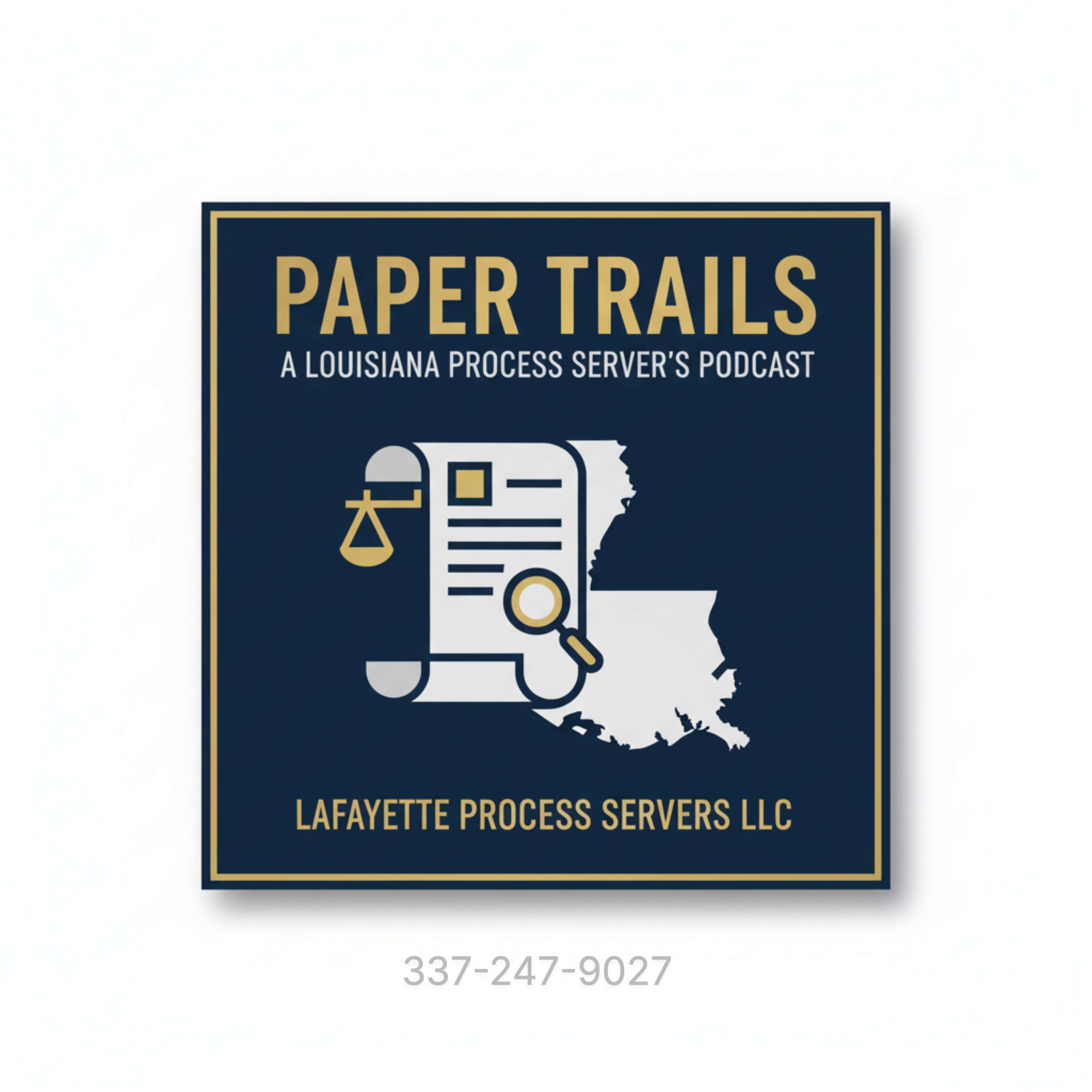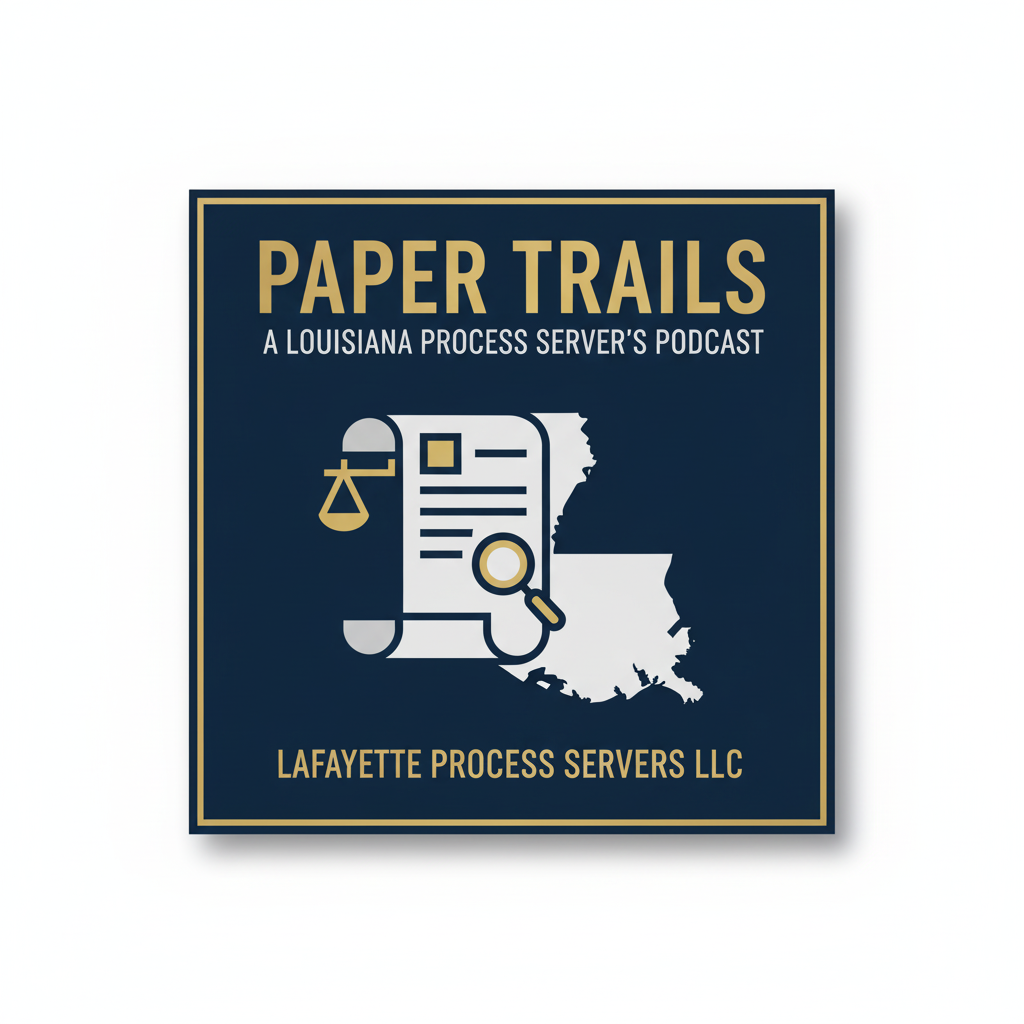Episode Transcript
[00:00:00] Speaker A: Welcome back to the deep dive. Today we're tackling a really high stress situation. You know the one, there's a knock, you look out, and someone, well, someone looking very official is standing on your doorstep, maybe with papers.
[00:00:13] Speaker B: Oh, yeah. It's a moment that just spikes anxiety instantly. The natural reaction, that gut feeling, is probably panic. Right. Or maybe wanting to just, you know, duck down and hope they leave.
[00:00:24] Speaker A: Exactly. And our source material today really focuses on that exact moment. It asks the big question, everyone, should I answer the door for a process server?
That's the core of our deep dive today.
[00:00:37] Speaker B: It's the perfect question to start with because that's the immediate decision, the thing you're wrestling with right then and there. But what's really interesting in the material we looked at is that the real takeaway isn't just a simple yes or no. It's more about understanding the rules of the game, so to speak, and crucially, what you must do next, no matter what you decide at the door.
[00:00:56] Speaker A: Okay, let's get into that high stakes moment then. We've got the question on the table. Should I answer the door? But maybe before we jump straight to the legal follow up, let's think about why people are even asking this. What does the research suggest about that moment of service itself?
[00:01:11] Speaker B: Well, a common thought is that if you just avoid the server, maybe the whole thing goes away, but the sources are pretty clear.
You might delay things a bit, sure, but you almost never stop the actual lawsuit. In fact, trying too hard to dodge service can backfire. Courts might then, okay, other ways to serve you, like just posting the notice or giving it to someone else at your home.
[00:01:33] Speaker A: Oh, wow.
[00:01:34] Speaker B: Yeah. And you might not even realize you've been legally served, which is obviously much riskier.
[00:01:39] Speaker A: Okay, so if dodging is mostly pointless, maybe even counterproductive.
[00:01:43] Speaker B: Yeah.
[00:01:44] Speaker A: Is there actually a benefit to opening the door, tactically speaking?
[00:01:48] Speaker B: There can be. Yeah. It comes down to control and knowing what's going on. If you do answer, you make sure you get the papers. You can see who the server is, maybe check their id, you know right away what the case is about, who's suing you, and importantly, what the deadlines are. And actually knowing those facts is way better than finding out later after the clock's already been ticking. Maybe because they left the papers with someone else.
[00:02:11] Speaker A: Right, so it sounds terrifying, but actually engaging. Taking the papers, noting the date might be the smarter legal move just because it gives you clarity.
[00:02:20] Speaker B: In many cases, yes. It establishes a clear starting point. You move from the state of like Anxious guessing to actually knowing what you're facing.
[00:02:29] Speaker A: You stop hiding from the server and start dealing with the actual claim.
[00:02:32] Speaker B: Exactly. And that leads us right back to why the sources shift focus so quickly away from just opening the door and towards the bigger legal picture.
[00:02:40] Speaker A: Yeah, I noticed that. We came in thinking about practical steps, but the sources immediately pivot to this like mandatory legal disclaimer.
[00:02:48] Speaker B: It's fascinating, isn't it, how they immediately stress that point before getting into the weeds of service rules. They insist that anything discussed, even what we're talking about now, is just general information.
[00:02:59] Speaker A: And that phrase, general information, that's really the key warning sign here. It means we can outline the issues, but we can't give you specific advice for your situation.
It's crucial to remember this is not a substitute for legal advice.
We know you want to be informed, but being truly prepared means knowing when general knowledge isn't enough.
Especially with something this serious, that recognition is so important.
[00:03:23] Speaker B: Think about how different legal rules can be. State courts, federal courts, rules in Texas versus rules in New York for the same kind of case, Totally different. Sometimes general info just can't cover all that variability.
[00:03:35] Speaker A: So that's why the materials insist that every legal situation is unique. It's not just a throwaway line. Why isn't there just one simple role, like always ask for id?
[00:03:44] Speaker B: Well, the moment that process server shows up, your situation stops being hypothetical. It becomes your specific legal case. There are real allegations, a specific court, maybe a specific judge assigned, and definitely deadlines that are already ticking. General advice can't possibly assess all those unique factors like is the service itself even valid under those specific court rules?
[00:04:06] Speaker A: Okay, so the seriousness of it means you need tailored advice, not a general rule book. Which means if you have been served, the next step isn't really a choice, is it? It's more of a requirement.
[00:04:17] Speaker B: That's exactly right. The sources are very direct here. Once those papers are in your hand, there's an urgent non negotiable action.
If you have been served with legal papers, you should consult with a qualified attorney immediately.
[00:04:29] Speaker A: Let's pause on immediately. That sounds pretty intense. Why the rush? Can't you take a few days to, I don't know, process things? Google a law firm?
[00:04:37] Speaker B: You really can't afford to wait. The legal system runs on very strict clocks. We're often talking deadlines measured in days, maybe 20 or 30 days, depending on the court.
[00:04:46] Speaker A: And if you miss that deadline, even.
[00:04:48] Speaker B: By one day, the consequences can be really severe. Often it's a default judgment, which means it means the court basically says, okay, you didn't respond, so we assume everything the other side said is true, and they can grant whatever relief was asked for money. Usually without you ever getting to tell your side of the story.
[00:05:06] Speaker A: Wow.
[00:05:07] Speaker B: Yeah. So general knowledge or trying to figure it out yourself won't protect you if you miss that crucial response window.
[00:05:15] Speaker A: That urgency makes total sense. Then the lawyer isn't just for reassurance. They're needed to navigate these procedural traps. The sources say you need the attorney to discuss your rights and options.
What does that actually mean in practice?
[00:05:30] Speaker B: Well, this is where the unique situation part really matters. When a lawyer looks at those papers, they're not just reading the complaint. They're scanning for dozens of procedural issues. And it's interesting what they often check first.
[00:05:41] Speaker A: Okay, what's usually top of mind for them?
[00:05:43] Speaker B: Often it's the service itself. Was it done correctly? Was the server licensed? If required, did they serve the right person at the right place using a method allowed by that specific court's rules?
[00:05:54] Speaker A: Ah, so they're looking for mistakes right away.
[00:05:56] Speaker B: Exactly. If there's a flaw in how you were served, the whole case might get thrown out or at least delayed. That gives you breathing room. You'd never spot those technicalities just from general reading online.
[00:06:08] Speaker A: That's a really important point. So the lawyer is essential because only they can really analyze the specifics, the papers, the court rules, the claims, the deadlines, and figure out your actual options.
Options like what?
Trying to settle. Challenging the court's location. Spotting a flaw in the original lawsuit itself.
[00:06:28] Speaker B: Precisely. All of those things. Defining your rights and options goes way beyond just common sense. It requires deep knowledge of the specific legal code and procedures. If you try to wing it based on general info, you could easily miss up. You might accidentally waive a really important defense without even realizing it. For example, filing the wrong kind of response could mean you lose the right to argue the cases in the wrong court later on.
[00:06:51] Speaker A: Got it.
So talking to that lawyer immediately isn't just about understanding the lawsuit. It's about kicking off your defense strategy properly.
[00:06:59] Speaker B: It's like activating your legal safety net. The second you're served, the game changes. The stakes are high. You need someone who knows how to navigate that specific legal maze and figure out what parts of your story your situation can help you fight back or at least minimize the damage.
[00:07:15] Speaker A: Okay, that really brings us full circle on this deep dive into. Yeah, pretty nerve wracking scenario. We started with that very direct practical question that causes so much stress. Should I answer the door for a process server.
[00:07:29] Speaker B: And what we found in the sources is that the most critical piece isn't necessarily what you do in that split second at the door. It's the mandatory super urgent legal follow up that has to happen right after the sources really hammer home that general knowledge just isn't enough. Here you need personalized professional help fast.
[00:07:47] Speaker A: So the big takeaway is clear. Yeah, maybe you can avoid the server for a bit, but once you have those papers, the legal clock is ticking. Specifically on your case. The time for googling is over. The time for calling a qualified lawyer has absolutely begun.
[00:08:00] Speaker B: Definitely. That's the knowledge that protects you not necessarily from the lawsuit itself, but from losing by default because you missed a step or a deadline.
[00:08:09] Speaker A: And just as we wrap up, here's something to think about. Consider what it means that the legal system itself basically assumes the moment a process server appears. Your situation is so unique and urgent that relying on general knowledge is almost guaranteed to be risky.
What does that suggest about how complex the system is? And maybe about the challenges for people who don't have quick, easy access to a lawyer when they suddenly need one? Something to mull over.


